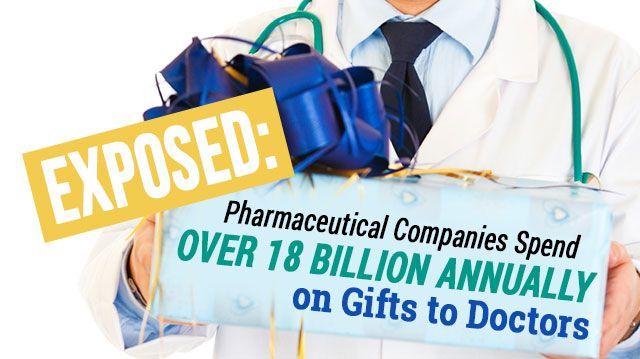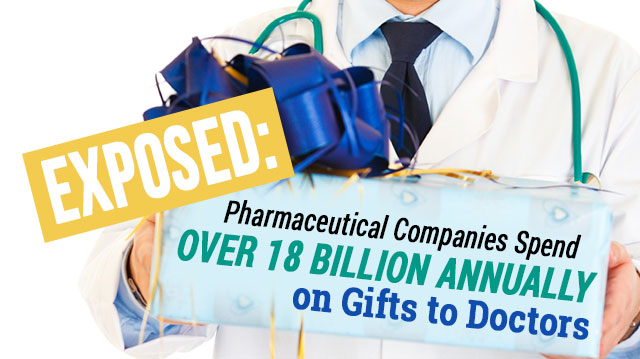
I worked in a busy family physician’s office about 18 years or so ago and was astounded by how many drug reps came in and out of the office loaded up with gifts like Santa. Cookies, candy, pads of paper, water bottles, hats, t-shirts, pens, flashlights, keychains, magnets and more… oh so much more!
What I remember most was how many times a week our whole office received lunch on the reps. They would call to ask how many were in the office and bring something for all of us. We had a big office of about twenty people, so that was some lunch bill, for sure.
There were snacks, tickets to sporting events, trips and other high-end items being handed out like candy on a daily basis. All for what? Well, in exchange for a little bit of time and an opportunity to push a new drug.
The reps would leave their gifts and samples of their drugs. They’d say a few words and hand the physicians some paperwork (company-funded research papers generally) and leave. The physicians kept the gift whether they started using the drugs or not. It was interesting and ugly at the same time.
Today is no different. In fact, pharmaceutical companies spend billions per year wooing doctors to use their products, no matter what it takes. They call it education… but is it really?
Doctors meet with drug company employees about sixteen times a month, and 94 percent of physicians accept gifts from the reps. Seems to be that this practice would make it pretty hard for a physician not to be selective about what drugs he/she is using… but the question would be, selective for what reason? Kind of hard to stay impartial when there is so much “education” going on!
Drug reps are trained to woo doctors
Drug reps are actually trained in how to win over doctors. They are taught how to manipulate a physician’s decision on behalf of the industry. Former drug rep Shahram Ahari who spent two years selling Prozac and Zyprexa for Eli Lilly told a Senate Aging Committee that part of his job was “rewarding physicians with gifts and attention for their allegiance to your product and company despite what may be ethically appropriate.”
According to Ahari, reps attend classes where they are taught how to be generous with samples to influence sales, how to go over budget with clients that really matter, how to exploit sexual tension, and how to use personal gifts to foster a quid pro quo relationship.
It is also common that drug companies hire former cheerleaders, models and athletes to make sure they have the right mix of personality and looks to peddle their products.
A PLoS study reports:
“Pharmaceutical companies spend billions of dollars annually to ensure that physicians most susceptible to marketing prescribe the most expensive, most promoted drugs to the most people possible.
The foundation of this influence is a sales force of 100,000 drug reps that provides rationed doses of samples, gifts, services, and flattery to a subset of physicians …
Physicians are susceptible to corporate influence because they are overworked, overwhelmed with information and paperwork, and feel underappreciated. Cheerful and charming, bearing food and gifts, drug reps provide respite and sympathy; they appreciate how hard doctor’s lives are, and seem only to want to ease their burdens.
But … every word, every courtesy, every gift, and every piece of information provided is carefully crafted, not to assist doctors or patients, but to increase market share for targeted drugs.”
Drug companies seek out new doctors… even in medical school
Medical schools permit drug companies to infiltrate and begin influencing early, even before physicians are finished school. One of the most prestigious medical schools in the country, Harvard, received an F from the American Medical Student Association on the scorecard for accepting gifts and bribes from drug reps. Young doctors are paid to attend meetings, speak at events and otherwise pledge allegiance to a particular drug or drugs. In 2008, Harvard accepted $11.5 million from the pharmaceutical industry for “research and continuing education classes.”
Drug reps are coached on how to respond to a physician’s questions about drugs
Drug reps are very persuasive; they are taught how to approach a physician to convince them that not only is their drug safe but also highly effective. Once a rep gets their foot in the door, drops off free samples, pens and pads, there is no turning back.
According to former high-end drug rep and author of the book Confessions of an Rx Drug Pusher, Gwen Olsen, drug reps actually have role-playing sessions where they learn how to respond and act in the face of physician contention and questions. They are schooled on how to “get inside the minds” of the physicians and to know the ins and outs of their prescription habits, which are key to a successful drug sale.
Shockingly, drug companies also hire firms to purchase data on doctors from pharmacies — this practice has been in place since the mid-1990s. These reports let drug sales representatives see all they need to know about the drugs a physician is prescribing. Armed with this information, reps can evaluate the efficacy of their sales pitches and adjust their sales techniques accordingly.
Ahari also says this: “It’s my job to figure out what a physician’s price is. For some it’s dinner at the finest restaurants, for others it’s enough convincing data to let them prescribe confidently and for others it’s my attention and friendship… but at the most basic level, everything is for sale and everything is an exchange.”
Doctors deny conflict of interest
How could physicians deny a conflict of interest and say that a nice dinner, smooth talking, a trip to their favorite resort, and more doesn’t in some way steer their decisions when choosing a drug to use? In reality, conflict of interest is one of the biggest problems in American health care today. Interestingly enough, most physicians will state that their colleagues may be susceptible to drug company influence, but not them. Seriously?!
What about the Sunshine Act?
The Sunshine Act, which was inserted in Obamacare by Senator Grassley, means that for the first time ever patients can see what, if any, ties their physician has to drug companies. However, both the drug companies and even the physicians have found ways around this act. There is even an article published by the Academy of Family Physicians which advises doctors on how not to be caught by the Sunshine Act.
For instance, drug companies have to report when they give doctors free meals valued at over $10. So physicians just give drug reps the right head count for the meal so that each meal falls below $10 per person!
How to stay safe amidst the drug pushers
 So, the big question here — and a practical consideration for everyone — is how do we stay safe? How do we know that when we are prescribed a drug, it has not been pushed on our physician?
So, the big question here — and a practical consideration for everyone — is how do we stay safe? How do we know that when we are prescribed a drug, it has not been pushed on our physician?
You really can’t tell, but you can do your own homework before going out and filling a prescription. First off, learn about the drug: What is it supposed to do, and what are the side effects? Furthermore, understand what your alternatives are — what you might be able to do that may be a safer option — a more natural option perhaps.
The worst thing you can do is simply take a drug just because your doctor prescribed it.
Be smart, stay smart and live smart!
— Susan Patterson
Susan is the Content Director at The Alternative Daily, a Certified Health Coach, Certified Metabolic Typing Advisor and Master Gardener. With an extensive knowledge of whole foods and wellness, Susan enjoys educating others on how to live healthy and sustainable lives. She presently lives in the mountains of Arizona with her three children and numerous animals.
Sources:
http://www.nejm.org/doi/full/10.1056/NEJMp078141
http://nutritionfacts.org/video/find-out-if-your-doctor-takes-drug-company-money
https://www.youtube.com/watch?v=y_RJ9QPG70U
http://gwenolsen.com/blog
https://www.thebureauinvestigates.com/2010/08/11/documentary-reveals-the-unhealthy-profits-of-the-pharmaceutical-industry

